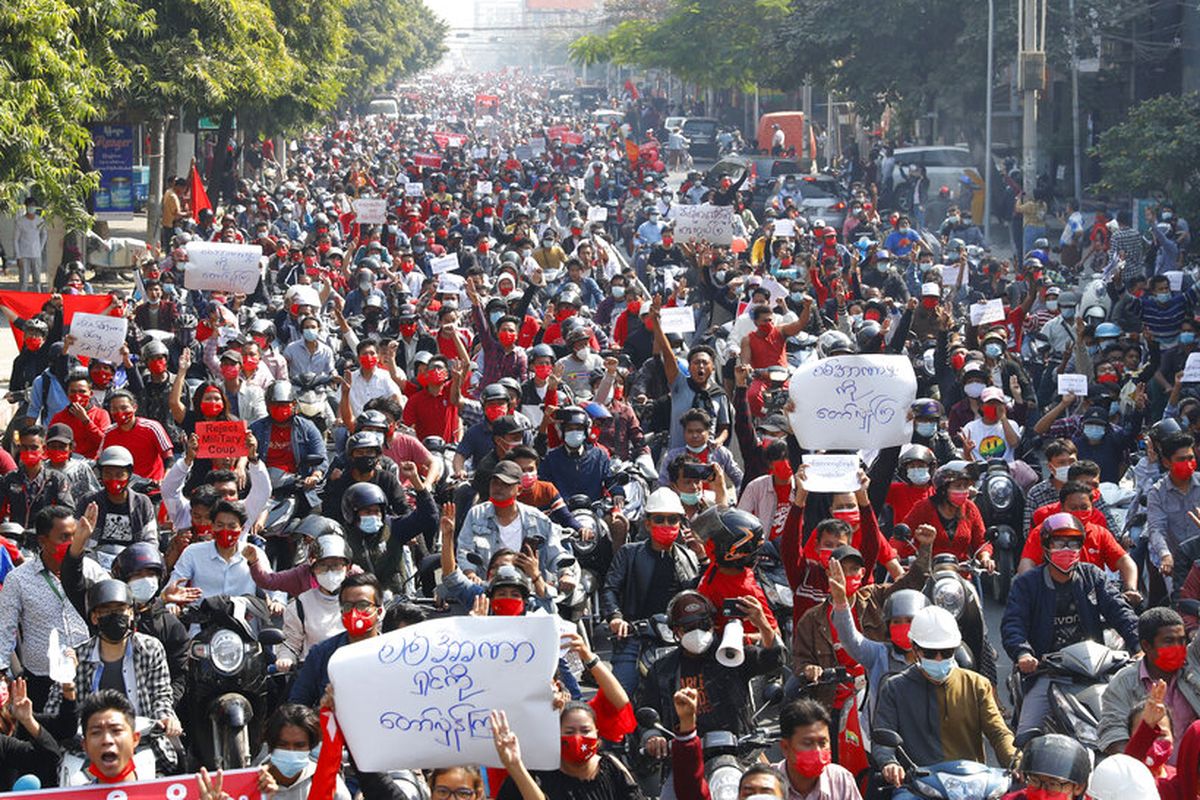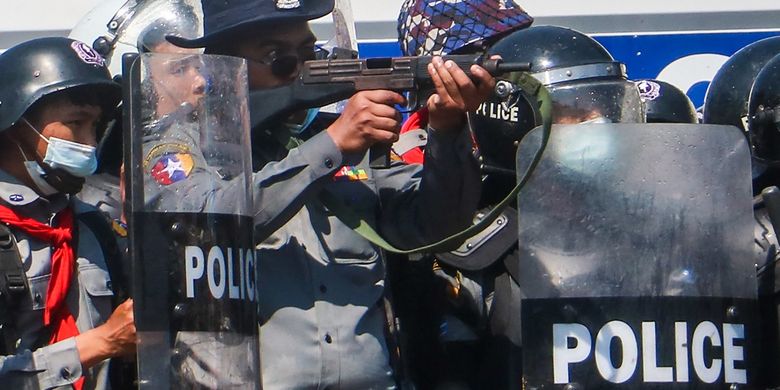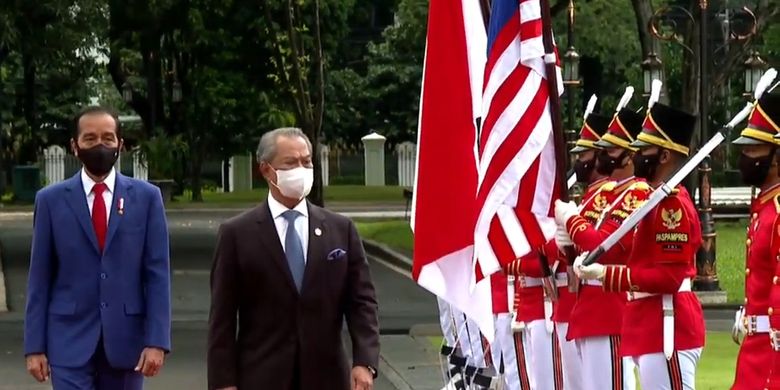
KOMPAS.com – Myanmar coup caught the world’s attention when the army declared a yearlong state of emergency and ousted democracy icon Aung San Suu Kyi, who led her National League for Democracy (NLD) party to victory in the 2015 election.
The coup came after Myanmar's generals alleged that the results of the November 8 general election — which the NLD won by a landslide — were fraudulent, despite no credible evidence to back up the claims.
The takeover has not only put an abrupt end to 10 years of a fledgling democracy in the Southeast Asian country but also reflects what experts call a worrying democratic regression in the region as a whole.
"The region was making very strong progress toward democracy, but it has backslid badly now," Joshua Kurlantzick, senior fellow for Southeast Asia at the Council on Foreign Relations, told DW.
Though democracy is not flourishing anywhere in Southeast Asia, which is home to openly undemocratic regimes like those in Brunei, Vietnam, and Laos, Kurlantzick said developments were most concerning in Myanmar, Thailand, Cambodia, and the Philippines, where attempts at civilian-led democratic governments are facing increasing opposition and resistance from entrenched elites.
 A police officer (C) aims a gun during clashes with protesters taking part in a demonstration against the military coup in Naypyidaw on February 9, 2021. (Photo by STR / AFP)
A police officer (C) aims a gun during clashes with protesters taking part in a demonstration against the military coup in Naypyidaw on February 9, 2021. (Photo by STR / AFP)Lee Morgenbesser, a senior lecturer at Australia's Griffith University whose research focuses on authoritarian regimes and Southeast Asian politics, shares a similar view. The expert told DW that "the coup confirms — if any further confirmation was needed — that authoritarian rule is a mainstay of political life in Southeast Asia."
Myanmar's experience is just the latest example of the "inherent fragility" of attempts at democracy in Southeast Asia, he said.
Myanmar following Thailand?
Despite embarking on an ostensible democratic transition in recent years, the Tatmadaw, as Myanmar's armed forces are known, never ceded power.
Also read: Democracy Gives Hope to Recover from Covid-19 Crisis, Says Indonesias Top Diplomat
The military-drafted 2008 constitution reserves 25 percent of parliamentary seats for the army and hands it control over the ministries of defense, interior, and border affairs, guaranteeing it a key role in political affairs.
The coup bears hallmarks of the one in neighboring Thailand, where seven years ago the army toppled a democratically elected government under the guise of resolving political conflict and restoring "peace and order."
But the promise made by Prayuth Chan-ocha, the junta leader at the time, that the military would hold power only temporarily turned into nearly five years of military dictatorship, during which the junta engaged in constitutional engineering that eventually saw Prayuth cling to power through the ballot box via the military's proxy party in 2019.
Also read: Public Confidence in Democracy Takes a Hit from Covid-19 in Indonesia
Similarly, the Tatmadaw could settle in for the long haul as the armed forces, which previously ran the country for five decades, are "certainly no stranger to ruling Myanmar for long periods of time," Morgenbesser said.
"The problem is that the Tatmadaw has found the political status quo to be untenable, which suggests they will attempt to rig the political system again in their favor," he added.
After saying the November election results were invalid, Myanmar's military has pledged a new vote after the yearlong state of emergency.
Kurlantzick fears that the armed forces will "try the Thai way of managing a return to quasi-democracy with a different electoral system that is biased against the NLD and favors the military and its allies, as the Thai military has done."
Democratic backsliding amid Covid-19
 Screen grab of Malaysia's Prime Minister Muhyiddin Yassin (right) inspecting the guard of honor at Merdeka Palace in Jakarta during his state visit to Indonesia on Friday February 5, 2021. Accompanying him is Indonesia's President Joko Widodo (left).
Screen grab of Malaysia's Prime Minister Muhyiddin Yassin (right) inspecting the guard of honor at Merdeka Palace in Jakarta during his state visit to Indonesia on Friday February 5, 2021. Accompanying him is Indonesia's President Joko Widodo (left). Entrenched elites clinging to power is not only an issue in Myanmar and Thailand. In some other Southeast Asian countries, authoritarian trends were evident long before the coronavirus outbreak, but some leaders are using the spread of Covid-19 as an opportunity to solidify their grip on power under the pretense of fighting the pandemic.
For the first time in more than half a century, Malaysia's once-peripheral king declared an eight-month nationwide state of emergency on January 12 in the hopes of reining in a surging coronavirus outbreak — a move that bolsters embattled Prime Minister Muhyiddin Yassin's vulnerable hold on power amid calls for an early election.
"Muhyiddin's government would probably have fallen had he not used Covid-19 to avoid calling Parliament and then established a state of emergency," Gregory B. Poling, senior fellow for Southeast Asia and director of the Asia Maritime Transparency Initiative at the Washington-based Center for Strategic and International Studies, told DW.
The pandemic has also led to a "worrying deterioration in civil-military balance in Indonesia, increasing human rights abuses in the Philippines, a further crackdown on opposition voices in Cambodia, and helped turn Thailand into a powder keg with the faux-democratic leadership facing off against a broad-based protest movement," Poling said.
Vulnerable to authoritarian tendencies
William Case, professor and head of the School of Politics, History and International Relations at the University of Nottingham Malaysia Campus, said the setbacks are "probably most disappointing" in countries like Indonesia and the Philippines where democracy had appeared to make the most progress but has been undermined by "sociopolitical intolerance and hideous human rights violations."
The recent chaos in the presidential handover of power in one of the world's leading democracies, the United States, is a clear demonstration of how vulnerable democracy can be too authoritarian tendencies, not just in Southeast Asia.
But while completing democratic transitions has proved difficult, the real challenge will be consolidating democracy, by strengthening institutions that ensure effective checks and balances on power — "hard, lengthy work that almost always involves setbacks and backsliding," Poling said.
"What is unclear is whether Southeast Asia is in a long-term spiral toward authoritarianism, or if these are just temporary setbacks in countries like Indonesia, the Philippines, Malaysia, and perhaps Thailand, which can still find their way through to a more democratic future."
Simak breaking news dan berita pilihan kami langsung di ponselmu. Pilih saluran andalanmu akses berita Kompas.com WhatsApp Channel : https://www.whatsapp.com/channel/0029VaFPbedBPzjZrk13HO3D. Pastikan kamu sudah install aplikasi WhatsApp ya.

































